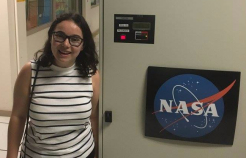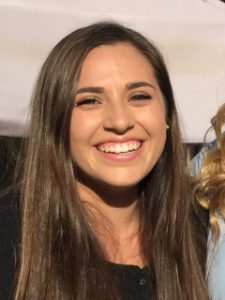By Julia Goldman | B.A. Candidate in International Affairs | ESIA ’18
In the past three years, I have traveled to the NASA Ames Research Center in California, ate a casual dinner with a four-star French general, and wandered around the French equivalent of the White House. None of this would have been possible without the GW Debate & Literary Society, also known as GWDebate.
GWDebate is more than your high school debate team. The team is a communications society, and while we go to traditional debate tournaments we also work on what we call civic debate projects. As a part of civic debate projects, we partner with civil society organizations for advocacy projects. In the past few years, we have partnered with NASA to talk about the morality of space exploration, the French Embassy in the run up to the 21st Conference of Parties in Paris, and the Indonesian Tourism Ministry to develop sustainable tourism plans.
One of the major goals of GWDebate is advocacy development. Via our participation in multiple kinds of debate, we learn how to communicate with any possible stakeholder. During the 2015-2016 year, the team worked on the NASA Astrobiology Debates, in which we worked in partnership with NASA to create scholarship on the morality of space exploration. I was lucky enough to debate in the final round of the NASA Astrobiology Debates Western Championship. As a part of that round, I advocated for the preservation of extraterrestrial microbial life in front of an amazing panel of experts, including the current head of the NASA Astrobiology program, the former head and founder of the NASA Astrobiology program, and a former astronaut, among others. As an international affairs major these were people that I never would have imagined being in the same room with, let alone having them take my opinions on astrobiology seriously. I then got to take the skills that I used in the debate space into the real world with a trip to the NASA Ames Research Center, where I spoke with scientists, lawyers, and students about the future of space exploration.
Debate has taught me how to advocate, how to talk to people, how to build an effective argument. and how to be a professional.
The other focus of the GWDebate team is professional development. Each project that we undertake is designed to help members of the team develop our professional skills and achieve our career aspirations. During my freshman year, I was presented with the opportunity to intern with the French Embassy’s Cultural Services Department. In my role at the embassy, I helped to plan the Lafayette Debates, a tournament that was comprised of nearly 100 students from three different countries. I also gained experience in website upkeep, running online competitions, and professional communications. As a topper to my internship, I traveled to Paris as a part of the French Embassy’s Young Ambassador’s Program. In Paris, I had the amazing opportunity to meet with senior level French, British, and American diplomats in advance of the 21st Conference of Parties. This initial opportunity helped to set me apart in the subsequent interviews that I went into, and developed my collegiate resume.
Employers say that communication skills are some of the most important attributes that they look at when considering a candidate. My journey with the GWDebate team has led me to a lot of places, including upstate New York, Paris, France, Mountain View, California, and a few random rest stops in New Jersey. But more than the places to which I’ve been, debate has taught me how to advocate, how to talk to people, how to build an effective argument. and how to be a professional.
These skills will be with me long after graduation and into my career.











